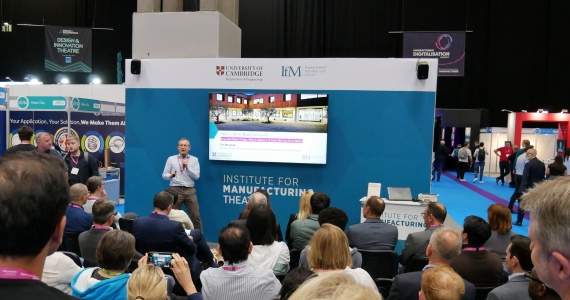IfM at Smart Manufacturing Week 2025

Last week, thousands of manufacturers, industry leaders, and technology providers came to the NEC in Birmingham for Smart Manufacturing Week (SMW) 2025.
Produced by The Manufacturer magazine, SMW is a national festival of advanced manufacturing. The Institute for Manufacturing (IfM) collaborates with The Manufacturer year-round, providing content on the latest IfM research and impact activities.
“SMW offers the IfM an opportunity to explore current industry trends in manufacturing, re-establish connections with partners, and engage with new organisations,” says David Lott, CEO of IfM Engage, the knowledge-transfer arm of the IfM.

As official knowledge partner for the event, the IfM delivered a packed schedule of masterclasses, keynotes and panel sessions at its dedicated IfM exhibition space.
This year’s topics included the journey to net zero, the future of industrial safety, the role of digital skills in SMEs, and how to foster inclusive leadership in manufacturing:
- A Roadmap Towards Net Zero
- Building Foundations for Sustainable Manufacturing
- Introducing the Manifesto for Global Industrial Safety – A Call to Action
- Professor Tim Minshall: Your Life is Manufactured - How Manufacturing is Making the UK More Resilient, Sustainable, and Equitable
- Women in Manufacturing: Inspiring Inclusive Leadership
- Engaging with the IfM, University of Cambridge: Opportunities for Organisations and Individuals
- SMEs, Apprentices & FE Colleges: Digital Skills for Real-World Impact
Each topic not only addressed current challenges faced in the industry but also emphasised innovation, sustainability, and inclusivity, showcasing the diverse paths towards a more resilient manufacturing sector.
Day 1 - Setting the agenda for sustainable and resilient manufacturing
SMW opened on Wednesday 4 June with a series of sessions focusing on some of the most pressing issues facing the manufacturing sector today - climate impact, safety, and long-term resilience.
The day began with “A Roadmap Towards Net Zero” from Dr Diana Khripko, IfM Engage Principal Solution Development Specialist, who revealed how to leverage collective organisational knowledge to define net zero strategy and achieve sustainability targets. Diana discussed the challenges of implementation, alongside opportunities for roadmapping for impact innovation and leadership in the transition to low-carbon operations.
This was followed by “Sustain 8: Building Foundations for Sustainable Manufacturing”, from IfM Engage Industrial Associate, Duncan Hurlstone, who explored how companies can embed sustainability into their operations at a structural level. He highlighted how the Cambridge Sustain 8 approach can support organisations in meeting the urgency, scale, high ambition required for sustainability improvement, and necessitates overcoming the sometimes complex language and calculations. .
After lunch, Dr Carlos López-Gómez, Head of the Policy Links Unit at IfM Engage, introduced the Manifesto for Global Industrial Safety, a bold new framework for enhancing industrial safety worldwide. Carlos explored how industries can adopt the manifesto’s principles to improve safety and resilience, the role of technology in shaping the future of industrial safety, and how harmonising global safety standards can benefit industries across regions.
Later in the afternoon, Tim Minshall, Head of the IfM, spoke about his new book: “Your Life is Manufactured.” The book explores how we make things, why it matters, and how we can do it better. Described as "fascinating" by The Times and "well-observed and enjoyably written" by the Financial Times, the book dives into how manufacturing touches every aspect of our lives - and why it holds the key to a more resilient future.
Day 2 - Collaboration and skills in focus
On Thursday, 5 June, the programme shifted towards collaboration and practical engagement, with sessions designed to connect industry, academia, and the future workforce.
The morning began with David Lott, CEO, IfM Engage who offered a closer look at how businesses and professionals can work with the IfM to access research expertise, training, and collaborative projects. “Engaging with the IfM, University of Cambridge: Opportunities for Organisations and Individuals” emphasised the value of long-term partnerships in tackling complex manufacturing challenges. During this session, we also learnt about the latest offerings from IfM Engage's Executive and Professional Education team, as Dil Sidhu, Business Development and Programme Director, presented an overview of custom programmes and short courses that draw from IfM's world-leading research.
From midday onwards, attention shifted to skills development with “SMEs, Apprentices & FE Colleges: Digital Skills for Real-World Impact." This extended session focused on how small and medium-sized enterprises, apprentices, and further education providers collaborate to deliver hands-on digital skills training. Real-world case studies illustrated how digital tools are integrated into production and how tailored training can help close the skills gap. We heard from the Digital Shoestring team, developed by researchers at the IfM, whose programme offers low-cost digital solutions for small to medium-sized enterprises.
Women in Manufacturing – Driving inclusive leadership
On Wednesday 4 June, two key sessions at SMW focused on the role of women in the manufacturing sector, highlighting both progress and ongoing challenges in building more inclusive workplaces.
Led by the Women in Manufacturing (UK) initiative, the day began with a panel discussion, “Women in Manufacturing – Shaping Inclusive Industries”, held in the Automation & Robotics Theatre. The session brought together professionals from across the industry to discuss practical steps toward greater representation and support for women in manufacturing roles. Topics included workplace culture, leadership development, and the importance of visible role models.
Later in the afternoon, the focus deepened with “Women in Manufacturing: Inspiring Inclusive Leadership” at the IfM Theatre. This session explored how leadership styles and organisational structures can either support or hinder inclusion. Speakers reflected on their personal experiences and shared insights into what has helped them progress in their careers.
Both sessions formed part of the wider WiM UK initiative, which is led by a network of academics and industry professionals committed to raising the profile of women in manufacturing. Attendees were also invited to contribute to a national survey on diversity, equality, and leadership, aimed at informing future strategies in the sector.
Rather than offering easy answers, the discussions were honest about the work still to be done, while also recognising the momentum that’s building. As the sessions concluded, there was a clear sense that improving inclusion in manufacturing is not just the responsibility of a few individuals, but a collective effort across the sector.
“SMW was an excellent opportunity for the IfM to engage directly with industry, education, and policy stakeholders. The pace of change in manufacturing is significant, and events like this allow us to better understand how our research and partnerships can support real-world transformation,” said David Lott, CEO of IfM Engage. “Our role at SMW is to act as a bridge - connecting leading research with the challenges and priorities faced by manufacturers today. The sessions we contributed to, from net zero to inclusive leadership, reflect the breadth of that mission.”
“SMW gave us a valuable platform to showcase the practical impact of the IfM’s work and to hear directly from organisations about the support they need. It was encouraging to see such strong interest in areas like digital skills, sustainability, and inclusive leadership,” concluded Robert Driver, IfM Engage Marketing Manager.









